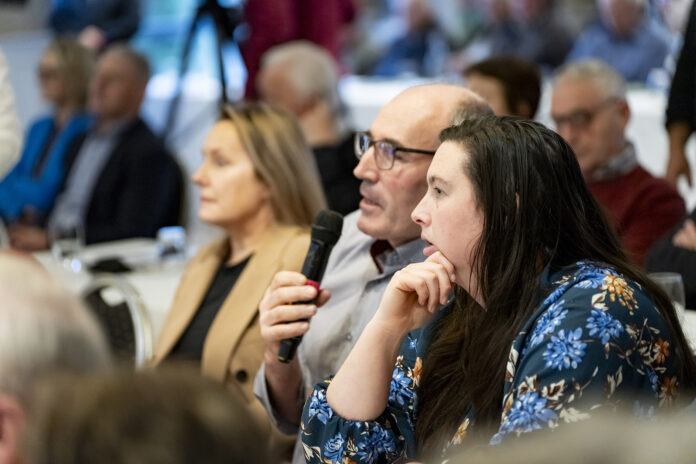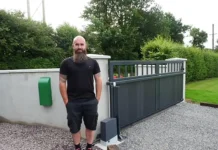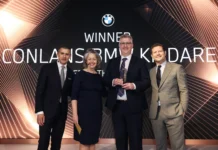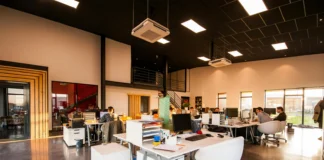
Over 300 delegates from all over the State assembled in Limerick’s Radisson Hotel to hear An Taoiseach, Leo Varadkar, Minister Charlie McConalogue and Minister Eamon Ryan address the packed event.
The ICMSA AGM must now be considered one of Ireland’s premier farming conferences and the Limerick-based organisation had a powerful line-up expertly chaired by outgoing President, Pat McCormack, who took advantage of the powerful guest speakers to tell them some ‘home truths’ about the state of farming and the problems faced by particularly dairy farmers all over the State.
Aside from the specific farmer problems like low prices and the havoc being caused by what Mr McCormack characterised as the ‘non-defence’ of Ireland’s Nitrates Derogation, the ICMSA President took unerring aim at what he said was the jaw-dropping double-standard evident in the Government’s attitude on emissions and the rise of NGOs and unelected Citizens’ Assemblies to a position where they now presented themselves as an alternative government and civil service.
Observing that the An Taisce action on the Nitrates Derogation is hugely symbolic of the way the Government has mishandled the Nitrates issue. Mr McCormack said that ICMSA is a notice party to this case due to be heard in December. Through its financial support of An Taisce, he said the State is effectively funding this legal action.
“The State won’t fund our legal action, farmers will have to fund it ourselves and ICMSA is happy to use our scare resources to do just that; we can’t just pass our legal bill along to a Government Department and tell them to settle that. But this episode demonstrates the absurdity of the Irish Government’s underwriting of environmentally based legal challenges to stated policy.
“Effectively, the Irish Government is funding An Taisce to take legal action against the Irish Government. The Irish Government is paying both sets of lawyers to prepare legal arguments for and against the policy as decided by the Irish Government. The only party to this legal case that is not sending its bill to the Irish Government are the farmers. We are on our own and no-one is picking up our bill. So be it. Nobody ever does and we’ll spend every cent we have in defence of what’s right and our members,” said Mr McCormack.
The Limerick AGM was told that this is interesting because it highlights an unmistakeable trend: the rise and rise and rise of the quangos and NGOs.
“The abdication of the civil service in the formulation of policy and the rise of very mysterious NGOs who seem to have become an alternative civil service able to not alone question Government policy, but demand – and get – Government money to mount those legal challenges to the Government.
“This sub-contracting of policy is now reaching frankly alarming levels and, in the rise and hype around Citizens’ Assemblies, we begin to see a whole parallel administration: unelected, unaccountable and unprecedented in a nation and society with a great and historical commitment to voting on who is elected to make decisions. Farmers – and I think very many others – are becoming perturbed and anxious about the levels of power and control that unelected and unaccountable NGOs seem to have assumed for themselves. And which elected individuals and offices of state seem only too happy to hand over,” he stated.
The ICMSA President said that if the Mecosur deal proceeds, then the Irish Government and the EU forfeit the right to ever mention sustainability again.
He said that if this Government is serious about climate change, then detailed negotiations along with funding need to take place so that we ensure that we have a vibrant climate efficient agriculture sector going forward. Without this, he maintained that it was just so much ‘hot air’ where we were told that a surplus of hot air is the main cause of the overall problem.
“Every single morning, we wake up to a working day that will be dominated by the word ‘emissions’ and how we can lower them? Rising emissions are – we never cease to be told – a global problem and the survival of the human race – not to mind our family farms – depends on lowering emissions. Imagine our surprise then to be told by Mr Peter Kearney of the State Air Traffic Control & Navigation agency that we can expect air travel to surge by 12% next year. Just in case that was too vague, we had Kenny Jacobs of DAA complaining that the current Dublin Airport passenger ceiling of 32 million was hopelessly inadequate – that was too low and it was going to cost Ireland money – and we had better get that up to 40 million pronto.
“Taoiseach, I’m no scientist but surely increasing passenger numbers from 30 million to 40 million is going to involve more emissions; it’s going to mean massively increased emissions. Obviously, that being the case, the Irish Government should have said we’re very sorry Mr Jacobs and Mr O’Leary, but we’re really committed to lowering emissions: that’s why we spend every day restricting Irish farmers and actually introducing measures aimed at lowering emissions. But Taoiseach that’s not what you said. Here’s the Sunday Independent of 5 November where you indicate that you support the lifting of the ceiling on passenger numbers from Dublin Airport.
“The reason you cite is that if we don’t offer those new routes then we’ll lost them to other competing hubs and airports. Taoiseach, we have been explaining to anyone that would listen that the moment we drop the volumes of milk that we produce in the most sustainable way on the planet, that that milk production will immediately switch to other locations that are not as sustainable – so Ireland loses the money, and the planet gets higher emissions.
“My question to you is why don’t emissions matter for flights overseas for stag parties and hen nights, but do matter for food production in Limerick or Tipperary or anywhere in Ireland? Cows are bad and have to go – but Hens and Stags are fine and can just work away.”
Replying, the Taoiseach conceded that there had been too much farmer-shaming and that the emissions from other sectors had not been given the negative attention and focus directed at farmers. There was a very strong contingent from Limerick and Clare hosting the delegates from every corner of the State and Mr McCormack thanked the Limerick office for their expert co-ordination of this complex and important event.







